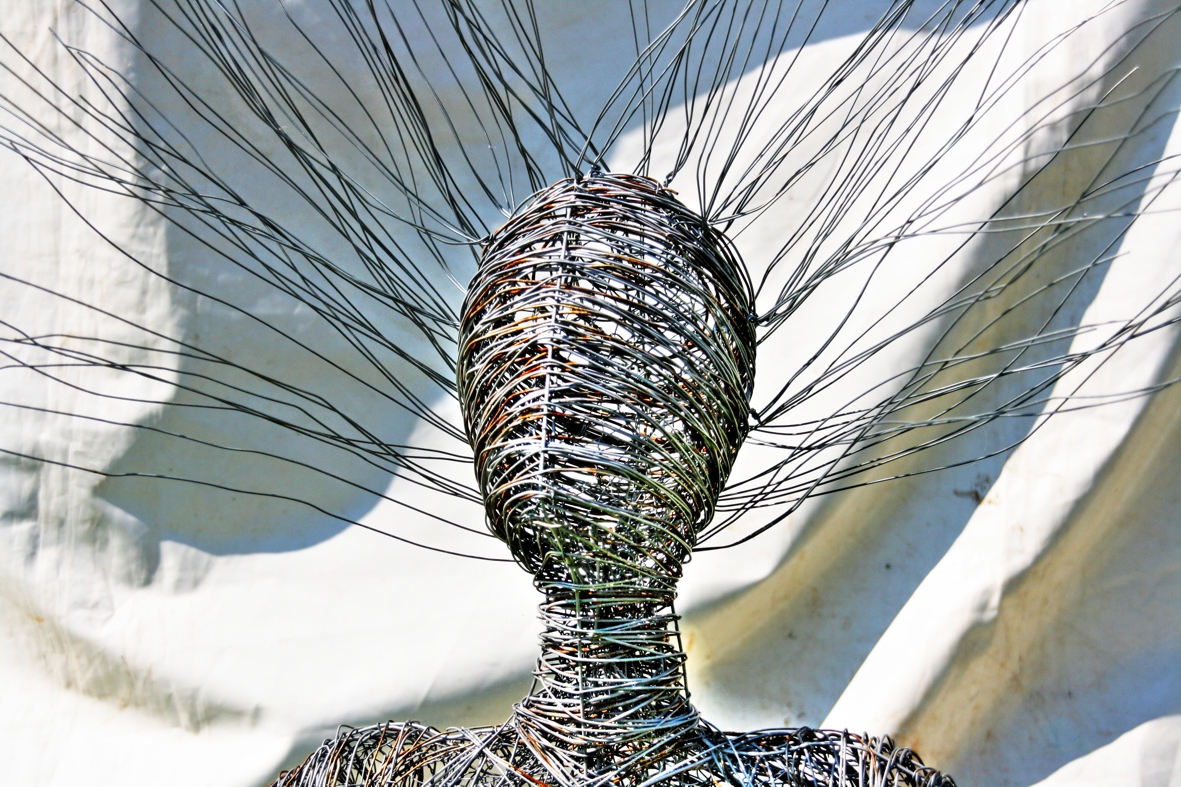We are all doomed to lose everything. I’ve lost three fingers, one arm, one eye. I’ve lost my family, my childhood home, my native tongue. I’m getting better and better at this. I’m mastering the art of losing.
Nowadays I speak in a metallic voice, since I lost my vocal cords. I write in these metallic words, these scales of a dead dragon.
I don’t breathe any more. I lost my lungs in the dusty air. Sometimes I really don’t want to look at this world any more. All I need to do is cover my biological eye with my hand, then I see abstractions. I see abstractions and I feel no pain. I feel no pain in this metallic self.
I think Asher is extremely lucky. He didn’t leave his planet, his country, even his city. Who can live like that these days? I remember my childhood friend held my hand and said, ‘Why aren’t we born in a city like New York? Then we don’t have to leave and we’ll stay together forever.’ We didn’t stay together and lost contact, and New York City is now a pile of dust, a pile of kipple.
I can keep whining about my loss and I really want to, but I want to talk about Asher. Asher is a kipple artist. He gathers kipple in his city and makes it into sculptures, paintings, and clothes. He said he was a glorified cleaner. I loved his work. We used to be close. Then he left me. He said I was not ‘organic’ enough. He is one of the few humans who remain completely biological, which seems pretty silly to me. But I respected his choice and tried my best to hang out with his ‘organic’ friends. Then one day he just looked at me with his pretty eyes covered with two slicks of tears and said we didn’t belong together. The next day I had my doctor scoop my heart out and put in a pump.
The next thing I knew, Asher’s new masterpiece made news. It was called ‘The Hollow Woman’ – a woman-shaped sculpture made of wires, circuit boards, and a lot of condoms. Underneath the tiny silicone breasts, where the heart should be, there was a hollow labelled ‘Silicon Valley’. Asher said in the interview, ‘this piece is the fragments I have shored against my ruins’.
His ruins. I looked at my body and all I saw was the ruins of a human. Maybe humans are always ruined. Some shored their narcissism against their ruins. Some shored work or weed or whiskey. But I see too clearly with my new eye. I see all the ugliness, nastiness, and viciousness, building up and reproducing themselves like kipple, like the seven seas of acid, keeping disfiguring this world day after day, year after year. The hurtful things we said to each other. The cruel marrow in our hollow bones. The meagre humane tenderness thin as the moisture on the panes, in a warm room in bitterly cold winter. The rough fingers that rubbed it off.
A familiar ghost once whispered in my ear: old fires to ashes, and ashes to the earth, which is already flesh, fur, and faeces.
Which is already kipple.
‘I am a tamed caveman.’ Asher once said, ‘Your eye is beautiful. The organic one.’ ‘Some people say mathematics is beautiful. I don’t feel anything about maths.’ ‘I’d rather feel pain than nothing.’ ‘Rotting and rotten.’ ‘If I have to be metallic like you, I’d be mercurial.’ ‘Sometimes I think you are essential to me. Only sometimes.’ ‘You are just a metal case of a woman.’
I’m not a metal case of a woman. I’m the ruins of a woman. The fragments.
I heard that if two people are more than one standard deviation apart from each other, their communication will break down. I know what Asher will say about it. I don’t want to hear from him any more. I don’t want to see his organic face any more. But his organic face is everywhere, and all these mutual friends of ours exist like tears between my eyeball and his melodrama.
There will be more works like ‘The Hollow Woman’ – a world full of albatross, marlin, briar, and prickly pear.
Destroy, She Said.
But she has no plot. She never had any plot.
One evening she and Asher just bump into each other, conveniently and lamely. He invites her for a cup of tea. She agrees. She still has no plot.
They arrive at his place. He closes the windows and turns on the air purifier, because the air is especially toxic during night-time. It can kill a purely biological being like Asher. He makes her tea. He starts drinking whiskey. He starts his harangue. He needs an audience like he needs clean air. In his voice she hears the sound of drowning. She waits. He dozes off. He starts snoring. For a moment she wants to cover him with a blanket. The blanket she bought him is still on the couch, though fraying at the edges. It has a piglet print on it, because his Chinese zodiac animal is pig. She used to call him piggy and he used to call her swineherd.
But the swineherd always kills the pig in the end.
She sits there, watching him, listening to him, like she did for so many years. Those years are like the Long River, which is now called the Long Desert.
And the apple-blossom is allowed to wither on the bough.
Listen to the kipple in the wind, crawling and prevailing, especially during night-time, when no one is looking.
The next day Asher makes front-page news. I don’t feel sad. I don’t feel relieved. I just feel wearied. My weariness piles up like dunes, day after day, year after year.
I am still searching, for diamonds in the countless grains of sand in the Ganges.
For diamonds in the kipple heap.
Jie Wang is a flash fiction / short story writer, born in China who has
been living in the UK since age 23. She is interested in the interaction
between literature and science. She received a BSc in Ecology from
Peking University and a Certificate in Creative Writing from the
University of Sheffield. Her work has been published / is forthcoming
in ‘Bewildering Stories’, ‘TERSE. Journal’, ‘Fleas on the Dog’, and
‘Writers Resist’.
Image Credit





This piece is haunting and has a sense of disconnected sadness. I’m not sure if that’s the right way to say it, but the main character speaks as though she is looking at all the events from a distance. She is sad, but it is a resigned type of sadness that has turned into a dull ache. Perhaps the disconnect comes from her being mostly robotic, but I found it to be effective.
The possibility of a human/robot hybrid is not unheard of, but Wang made the idea one of necessity due to a dying Earth and not something done purely out of greed or a desire to be immortal. I loved the name of Asher’s art piece ‘this piece is the fragments I have shored against my ruins’ and I liked how this idea is echoed throughout the story.